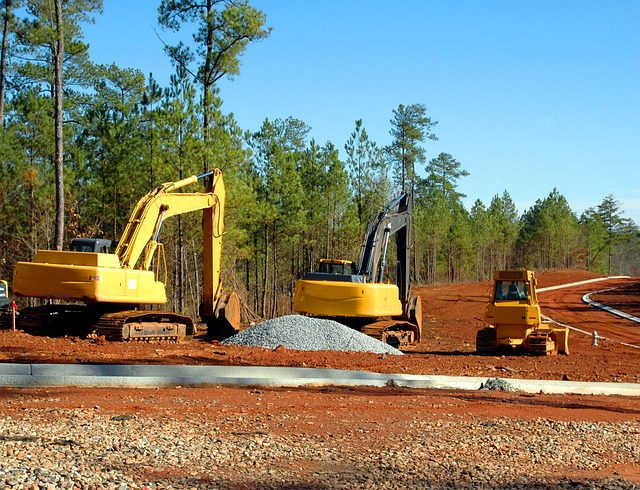What is a Land Development Loan?
Various factors can make acquiring land and developing property on it costly. Raw land typically has a high purchase price. Clearing and grading land to prepare it for construction can be a significant expense, especially if the terrain is uneven or densely wooded.
Building roads and necessary infrastructure, such as water, sewage, and electricity connections, also increases costs. Developers must also account for the costs of obtaining permits and meeting regulatory requirements, which can further increase expenses. Many projects require environmental impact assessments, which take time and money to complete.
Combining these factors can make land development a financially demanding process that requires careful planning and budgeting. This is why many developers turn to land development loans.
Land acquisition and development loans are tailored to finance projects on raw land. These loans cater to individuals seeking funds to develop land and build new construction, such as buildings or infrastructure. Typically, financial partners provide these loans, which are secured by the land’s value.
Interest rates on land development loans may fluctuate based on various factors, such as the borrower’s credit history and the scale of the project. Borrowers can utilize these loans to acquire the necessary funding for their construction ventures.
A land purchase loan is a crucial financial tool for those looking to embark on projects on undeveloped properties. By securing this type of loan, borrowers can kickstart their building endeavors without having all the required capital upfront.
How do Land Development Loans work?
Developers and investors can obtain land development loans from banks, credit unions, private lenders, or online lenders. These loans are designed to fund land acquisition, development, and construction for residential, commercial, or industrial purposes. To qualify for a land development loan, developers typically need a solid business plan, a good credit score, and a down payment of at least 20-30% of the total project cost.
Once developers secure a land acquisition and development loan, they can use the proceeds to purchase raw land, pay for site improvements such as grading, utilities, and roads, obtain necessary permits and approvals, and cover construction costs. The loan can also be used for further development initiatives, such as financing architectural and engineering fees, legal expenses, and other project-related costs. Higher interest rates and additional fees are often imposed to compensate for the perceived higher risks in land development loans.
Land development loans provide developers with the necessary capital to bring their projects to life and ultimately turn a profit by selling or leasing developed properties. By carefully managing the loan funds and adhering to the loan agreement terms, developers can complete their land development projects and achieve their financial goals.
What are the best Land Development Lenders?
Land development loans are specialized financing options, typically provided by various lenders, including traditional banks, credit unions, private investors, and specialized lending institutions. These lenders offer financing for purchasing land, infrastructure development, and construction projects.
Traditional Lenders
Traditional lenders like banks and credit unions can be reliable options for land development loans. These institutions typically offer competitive interest rates and flexible repayment terms for borrowers looking to finance land development projects. However, the approval process for land development loans from traditional lenders can be more stringent and time-consuming than that of alternative financing options.
Alternative Lenders
Land development loans from alternative and online lenders offer quicker approval and less strict qualifications than traditional lenders. These lenders typically utilize technology to streamline the application and approval process, allowing developers to access funds more efficiently.
However, these benefits come at a higher cost, as alternative and online lenders may charge higher interest rates or fees to offset the increased risk associated with these types of loans. Despite the higher cost, the convenience and accessibility of alternative and online lenders can make them a viable option for developers looking to secure financing for land development projects.
Private Investors & Specialized Lending Partners
Land development loans from private investors and specialized lending partners offer unique advantages compared to traditional or alternative lenders. These lenders often have a deeper understanding of the real estate market and are more willing to take on higher risks associated with land development projects.
Private investors and specialized lending partners may also offer more flexible terms, such as interest rates, repayment schedules, and loan amounts, explicitly tailored to the borrower’s needs. Additionally, these lenders may provide quicker approval processes and access to larger loan amounts than traditional lenders, making them an attractive option for developers looking to fund their projects efficiently and effectively.
Finding & Choosing a Lender
To find the best land development lenders, it is essential to research and compare rates, terms, and loan options from multiple sources. Online platforms, industry directories, and networking with real estate professionals can also help identify reputable lenders specializing in land development financing.
It is crucial to consider the lender’s experience in the real estate industry, track record of successful projects, and willingness to work with developers on unique or complex land development ventures.
How do you qualify for a Land Development Loan?
Lenders evaluate land development loan requests based on various factors. Lenders use various criteria to determine eligibility and the maximum loan amount. Specific requirements vary from lender to lender, but here are the most important considerations when applying for this type of loan.
Credit History and Financial Stability
Your credit history plays a significant role in determining your eligibility for a development loan. Lenders assess your credit score to evaluate how well you manage debt and make timely payments. Most lenders will pull your full credit report using a hard credit inquiry.
They consider your overall financial stability, including existing debts and liabilities. A good credit history increases your chances of qualifying for a land development loan.
Demonstrating Repayment Ability
To qualify for a land development loan, you must show you can repay the borrowed money. Lenders want to ensure you have the financial means to repay the loan. This demonstration often involves showcasing your income, assets, and financial stability to assure lenders of repayment capability.
Project Details and Planning
A detailed project plan is vital when applying for a land development loan. Lenders typically require a comprehensive overview of the proposed development projects, including timelines, cost estimates, and potential risks. This plan gives lenders confidence in the project’s feasibility and helps them assess the risk associated with funding it.
Down Payment
A sufficient down payment is crucial when applying for a land development loan. Lenders typically require a down payment of 20-25% of the total project cost to qualify for financing. This demonstrates to the lender that you have a financial stake in the project and reduces their risk. Securing a land development loan for your project may be challenging without a substantial down payment.
How do you apply for a Land Development Loan?
Applying for a land development loan involves gathering and submitting the required documents and financial details. Borrowers must provide information about their development project, including plans, permits, and cost estimates. Financial partners then review the borrower’s creditworthiness and assess the project’s potential profitability.
Project Plans
When applying for a land development loan, borrowers must present their project’s comprehensive details. This includes architectural plans, necessary permits from local authorities, and accurate cost projections for the entire development process.
Producing realistic financial projections is essential. Providing these documents helps lenders evaluate the feasibility of the project and the borrower’s ability to manage it effectively.
Evaluation and Approval
Financial partners carefully evaluate each development loan application to determine its viability. During the loan origination process, they assess the borrower’s credit history and financial stability and the potential success of the proposed project.
Lenders analyze various factors before approving a land development loan, such as repayment capacity, previous experience in similar projects, and overall financial health.
Lenders decide based on multiple criteria once all necessary documentation is submitted and reviewed. Factors such as interest rates, repayment terms, and the amount of funding required for purchasing raw land or hiring contractors are considered during this evaluation process.
Open communication with your lender during the loan phase is crucial for project success. Regular monitoring of project progress is essential to identify and resolve potential issues.
What are the advantages of Land Development Loans?
Borrowers can utilize land development loan funds to make necessary improvements and construct buildings on the land they intend to develop. This type of loan presents an opportunity for financial partners to invest in potentially profitable development ventures.
Interest rates associated with land development loans are usually quite competitive, making them appealing for borrowers seeking financial assistance for their projects. These loans offer a viable avenue for individuals or companies looking to embark on new construction endeavors but lacking the immediate funds required.
Borrowers who secure a land development loan can access substantial amounts of capital to enhance the value of their property through various developments. By leveraging this financial support, developers can transform vacant lots into vibrant communities or commercial spaces, increasing their profitability and contributing positively to local economies.
One significant benefit of these loans is that they allow borrowers to allocate borrowed funds strategically toward different aspects of their projects, including architectural design, infrastructure enhancements, landscaping, and more. This flexibility empowers developers to tailor their investments to each unique development endeavor’s needs and requirements.
What are the disadvantages of Land Development Loans?
Land development loans have some drawbacks that borrowers need to consider before pursuing this type of financing. One significant disadvantage is that qualifying without a solid project plan and proven financials can be difficult. Many lenders prefer working with borrowers with a successful track record of completing real estate development projects.
While these loans can provide substantial funding, you likely won’t find a lender that offers 100% financing. In most cases, borrowers must have a significant down payment, usually 20%-25% of the estimated project costs. It can be challenging to accumulate that capital to qualify for these loans.
Most land development loans offer competitive interest rates, but the long-term nature of the loan means borrowers pay a significant amount of total interest. Other costs include conducting a property title search, appraisals, permits, contractor fees, and closing costs.
Another challenge is repayment difficulties. Since land development projects often require significant time to complete and generate revenue, borrowers may struggle with making timely repayments on their loans. The long-term nature of these projects, combined with high costs, can put financial strain on borrowers, impacting their ability to meet repayment deadlines.
Land Development Loans Pros & Cons
Pros:
- Provide funding for purchasing land and developing properties.
- It can help investors take advantage of opportunities in the real estate market.
- Allow for the construction of new homes or commercial buildings.
Cons:
- It can be difficult to qualify.
- Require a significant down payment.
- Risk of project delays or cost overruns impacting repayment ability.
Frequently Asked Questions
Here are the most common questions about land development loans.
What type of down payment do I need for a Land Development Loan?
Land development loans typically require a down payment of 20% to 30%. The exact amount can vary depending on the lender and the specific project. This down payment secures the lender, ensuring the borrower has a financial stake in the project’s success. Some lenders may consider less than 20% down, but you’ll likely have to carry mortgage insurance, increasing your monthly payment.
For land development loans, the down payment can be made in cash or through equity in the property. Cash payments involve providing funds upfront, while equity contributions mean using the existing property value towards the down payment. Lenders consider both of these options when assessing the borrower’s financial commitment and ability to manage risks associated with land development projects.
Borrowers’ creditworthiness and land development experience are significant in determining the required down payment amount. A strong credit history and successful track record in similar projects may lead to lower down payment requirements, as lenders perceive less risk with experienced borrowers. Conversely, inexperienced borrowers or those with poor credit may face higher down payment demands to mitigate potential risks for lenders.
Does the property serve as collateral for a Land Development Loan?
Land development loans are secured by collateral, often the property being developed. This means that if the borrower fails to repay the loan, the lender can take possession of the property. Raw land is commonly used as collateral for these types of loans.
What are the costs of Land Development Loans?
Land development loans encompass several costs that borrowers must consider when embarking on development projects. These costs typically include interest rates, repayment terms, and various fees associated with acquiring raw land for development purposes. Before initiating a project, borrowers must evaluate these expenses carefully.
What other types of Real Estate Loans are available?
Apart from land development loans, real estate loans come in various forms. Borrowers have different options based on their needs and project requirements. Here are some popular real estate loans to consider.
Mezzanine Financing
Mezzanine financing is a type of real estate loan that sits between senior debt and equity in terms of risk and return. It is typically used to fill the gap between the senior debt available and the total project cost. A second mortgage on the property secures mezzanine loans, often with higher interest rates due to the increased risk for lenders.
Construction Loans
Construction loans are specifically designed to fund the construction of a new building or property. They typically have shorter terms and higher interest rates than land development loans, which are used to purchase land for future development and may include funds for infrastructure improvements.
Real Estate Investment Loans
Real estate investment loans and land development loans are both types of financing used in the real estate industry. They both involve borrowing money to invest in real estate properties.
However, the main difference is that real estate investment loans are typically used to purchase existing properties for rental income or resale, while land development loans are specifically for financing the development of raw land into residential or commercial projects.
Rehab and Fix & Flip Loans
Real estate rehab loans are specifically designed for investors who want to purchase properties that need renovation or repair. These loans provide the necessary funds to acquire the property and cover the costs of rehabilitating it.
Fix-and-flip loans are short-term financing options for investors who aim to purchase a property, quickly renovate it, and then sell it for a profit. Both types of loans are popular among real estate investors looking to maximize their returns through property upgrades and resales.
Bridge Loans
Bridge loans are short-term loans used in real estate to bridge the gap between purchasing a new property and selling an existing one. The purchased property typically secures these loans and can provide quick access to funds for real estate investors looking to capitalize on opportunities without waiting for traditional financing.
Due to their short-term nature and higher risk, interest rates on bridge loans are often higher than on conventional loans.
Commercial Real Estate Loans
Commercial real estate loans are specifically designed for businesses looking to purchase property for their operations, such as office buildings, retail space, warehouses, factories, etc. These loans typically have shorter terms and higher interest rates than land development loans, which are intended for developers looking to purchase land for future construction projects.
The main difference lies in the loan’s purpose and the real estate development stage. A commercial mortgage provides businesses with more options than leasing.
SBA 504 Loans
In some cases, using an SBA 504 loan for land development may be possible. 504 loans offer long-term, fixed-rate financing of up to $5 million for major fixed assets.
504 loans are available through Certified Development Companies (CDCs) authorized by the SBA. Eligible businesses for a 504 loan must meet SBA size guidelines and have the ability to repay the loan. 504 loans offer long-term, fixed-rate financing of up to $5 million for major fixed assets.
You must show that the project will lead to economic development in the proposed area. Land development projects often create employment opportunities and stimulate local economies. The 504 loan program provides long-term, fixed-rate financing for assets that promote business growth.
What is a Land Development Loan – Final Thoughts
Land development loans are a type of financing specifically designed to fund land development for residential, commercial, or industrial purposes. Developers and investors typically use this type of loan to cover the costs of preparing the land for construction, such as clearing, grading, and installing infrastructure.
Borrowers have various lenders and factors to consider when pursuing these specialized loans. The size and scope of your project, creditworthiness, and financial standing all play a crucial role in determining the best land development loan options for your needs.
Contact us if you have more questions about land development loans or applying for a small business loan. Our alternative financing experts can help you find the best funding options for your business needs.


















